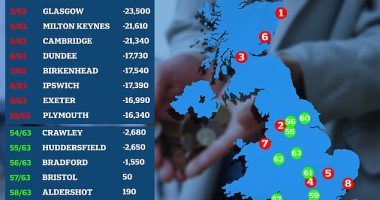THE £50 banknote was once described as the “currency of the corrupt elites”.
But in October 2018, government ministers opted against scrapping it, in hope of developing a more durable and secure note. Here’s what we know.
When will the new £50 be released?
Today, the Bank of England (BoE) finally announced when the new £50 note will be released.
The newest polymer bank note will be launched into circulation on June 23, 2021, in honour of code-breaker Alan Turing‘s birthday.
The plastic notes have been replacing the paper versions over the past few years as they have been designed to be more secure.
The two windows and two-colour foil make it more difficult to counterfeit, while the polymer material is waterproof and harder to rip, making them last longer.
The £50 note joins the Winston Churchill £5 note, Jane Austen £10 note and JMW Turner £20 note.
Paper £50 notes can continue to be used even after the new version has been released into circulation.
The BoE hasn’t set a date for when the paper ones will be withdrawn yet, but has promised to give at least six months notice.
There are currently 300 million £50 notes in circulation, with a combined value of £16.5billion.
Who features on the note?
The new £50 note features World War II code-breaker Alan Turing.
Turing, who worked at GCHQ at Bletchley Park, is best known for cracking Enigma to decrypt Nazi messages – shortening the war by four years.
Benedict Cumberbatch played the troubled scientist in the 2014 film, The Imitation Game.
Despite his monumental help with the national effort in WWII, he was charged over homosexual activity in 1952.
BoE boss Andrew Bailey said: “There’s something of the character of a nation in its money, and were right to consider and celebrate the people on out banknotes….
“By placing him [Turing] on our new polymer £50 banknote, we are celebrating his achievements, and the values he symbolises.”
Director of GCHQ Jeremy Fleming said the note is a “landmark moment” in history.
He said: “Turing was embraced for his brilliance and persecuted for being gay.
“His legacy is a reminder of the value of embracing all aspects of diversity, but also the work we still need to do to become truly inclusive.”
Back in 2018, the BoE asked members of the public to offer their suggestions for scientists who should appear on the notes.
This led to a list of 989 eligible names of people who are real, dead and have contributed to science in the UK.
The Bank received 227,299 nominations for Turing during the six-week period.











